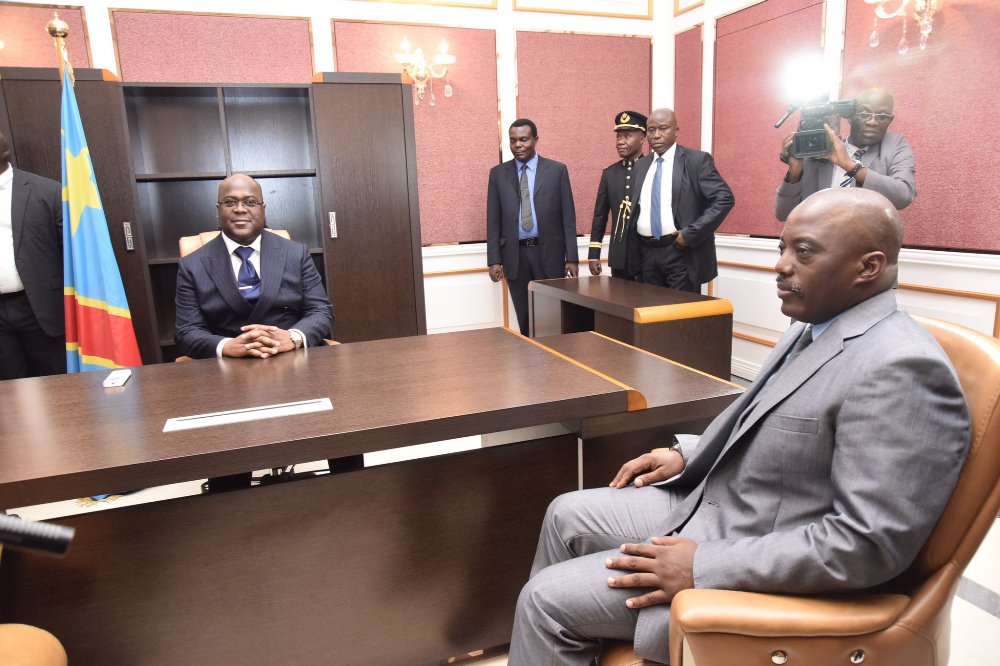As Joseph Kabila, former President of DRC prepared to pack his bags after enjoying 18 years at the helm of this vast mineral rich country, he realized some leaders elsewhere have suffered out of office because they did not plan their exit.
The calculative and filthy rich Kabila hatched a plan to enter an agreement with the incoming Félix Tshisekedi Tshilombo all aimed at protecting him and his allies once out of office.
On January 8, 2019, two days before the proclamation of the provisional results of the presidential election of December 2018 by the Independent National Electoral Commission (CENI), Kabila signed this agreement with his opponent Tshisekedi.
What did these two personalities say to each other? What commitments did they make? What mutual pledges did they give each other?
One morning at the PPRD headquarters, Emmanuel Ramazani Shadary declared that the secret agreement between Tshisekedi and Kabila was signed in his presence and only Kabila keeps a copy.
However, before senators and national deputies of his political family, Joseph Kabila affirmed that the famous deal was concluded in the presence of three heads of state.
After several months of cross-checking, a local media outlet 7SUR7 exclusively revealed details of this highly secretive deal between the two powerful men of DRC Kabila and Tshisekedi.
Below is a Seven-point strategic deal.
- Total immunity for the Kabila clan (family and dignitaries of its regime). No criminal prosecution for all possible crimes committed (blood crimes, economic crimes and others).
- Consultation between the two leaders (Tshisekedi-Kabila) before any implementation, especially in the security services (Army, police and intelligence services), public companies, and territorial. This is the famous concept of co-management.
- Support during the 2023 presidential election by Tshisekedi’s political family for the FCC candidacy, Kabila’s political family. “Principle of” reciprocity “, I support you, you support me”, explained a source.
- International witnesses: 3 presidents, the Kenyan Uhuru Kenyatta, the Egyptian Abdel Fattah Saeed Hussein Khalil el-Sisi, and the South African Cyril Ramaphosa.
- National witnesses: 5 generals including: Delphin Kahimbi (former head of intelligence and former number 2 in the army, since deceased). Célestin Mbala (ex-chief aide of Kabila’s camps and current head of the army). John Numbi (ex-chief of police, ex-boss of the air force, ex-inspector of the army, now retired). Amisi Kumba known as Tango Four (former boss of defense zone 1 and current inspector general of the army). Jean-Claude Yav Kabey (ex-boss of Kabila’s personal security and therefore of the Republican Guard).
- Name of the agreement: “Agreement for stability and peace in the Congo”.
- Place of signature: Kingakati farm located in the eastern suburbs of Kinshasa.

Félix Tshisekedi admitted on February 26, 2019, during his visit to Windhoek (Namibia), to have had an agreement with his predecessor Joseph Kabila, but for a coalition government.
“It is a deal that we made so that, first, the alternation is done peacefully. So there was this agreement, and it was done peacefully so that after the legislative elections and the majority which emerged from it, there is a coalition with Mr. Kabila’s camp, the outgoing camp, “President Tshisekedi said in response to a question from a journalist.
For several weeks now, the Kabila camp has been complaining about the violation of the “deal”, notably with the presidential orders of last July in the security services and in the judiciary. Faced with these criticisms, supporters of President Tshisekedi maintain that “the salvation of the people is the supreme law” and Tshisekedi takes up this principle more and more in his speeches.
Almost two years after the government coalition agreement, trust between the two partners has given way to mistrust, mistrust and even bitterness.
The ruling coalition is on the verge of collapse. Joseph Kabila, without a post but still holding considerable power over the state thanks to his parliamentary majority, consults extensively. He doesn’t want to lose the power he pretended to leave.
For his part, Tshisekedi, after having kept a low profile at the start of the legislature, has gradually started to pull out his increasingly sharp claws. Depicted by his detractors as a puppet in the hands of Kabila, the 5th president in the history of the DRC with only 32 national deputies upsets the political balance by not hesitating to scratch his allies. He decided to start consultations with political and social forces, warning that he would not rule out any scenario.
One would however, ask, is this the end of the coalition? The future will tell. But in the meantime, the battle is underway in the political headquarters. The FCC, which sees its political hegemony threatened, has held more meetings. On the side of the LAMUKA opposition, it is a wait-and-see policy. But several of its leaders do not hide their satisfaction when they see the setbacks of the FCC-CACH coalition.


